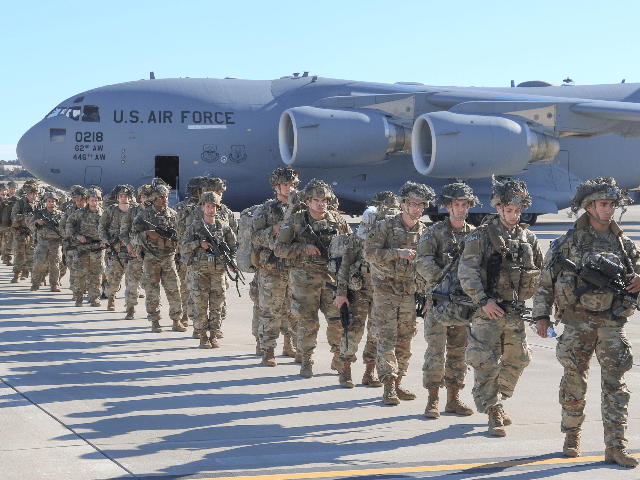Iraqi lawmakers loyal to Iran and its Shiite militia proxies announced on Thursday they are working on legislation to expel American forces from Iraq.
The announcement came hours after Iran’s militia forces retreated from the U.S. embassy in Baghdad after launching an alarming, but ultimately unsuccessful, attack on Tuesday.
A statement from Iran’s Kataib Hezbollah militia (KH) on Thursday translated by the Kurdish news service Rudaw portrayed the legislative push as the embassy assault – which they described as a “protest” – simply moving to a different venue, namely the Iraqi legislature.
“Heeding the call of Mr. Adil Abdul-Mahdi to change the location of the protests, we changed the location, before serious work to legislate a law to expel foreign, criminal invading troops from dear Iraq,” KH said, referring to the former prime minister of Iraq, who still occupies his office despite having resigned in November.
“We reiterate that we will not rest until every last foreign troop exits our holy land, and we will follow up and monitor Iraqi political efforts in its constitutional institutions, especially the parliament, to commence next week in legislating this law,” KH said, threatening reprisals against Iraq legislators who do not play along and promising terrorist attacks against Americans if they remain in Iraq.
Abdul-Mahdi resigned because the actual “protesters” in Iraq – the people risking their lives to protest against KH and Tehran’s influence over Baghdad – pushed him out of office.
Despite the efforts of Iranian proxies (and some U.S. media outlets) to conflate the embassy attackers with the genuine Iraqi protest movement, the real protesters are furious about the influence of Iran, which has dispatched thugs and terrorists to kill them. The real protesters have attacked Iranian consulates in Iraq and pulled the Iranian flag down from one of them.
Iraqi President Barham Salih, who threatened to resign in late December rather than appoint Iran’s choice of prime minister to replace Abdul-Mahdi, condemned the attack on the U.S. embassy as a “violation of international protocols and agreements binding to the Iraqi government.”
As U.S. media outlets labored to make “Iraqi protester” synonymous with “Iran-backed militia forces,” the actual protesters became completely invisible – it is hard to find a mainstream media story this week that quoted a single one of them.
Politico, for example, pretended to be confused when President Donald Trump addressed “many millions of people in Iraq who want freedom and who don’t want to be dominated and controlled by Iran” in a tweet, as though it was not sure who he might be talking about.
It fell to Al-Jazeera, of all media organizations, to mention on Wednesday that the protesters who dominated news out of Iraq for the past few months dislike Kataib Hezbollah and the other Iranian proxy militias. The real protesters issued a statement on Tuesday declaring their movement had “nothing to do with what is happening in front of the U.S. embassy in the Green Zone, central Baghdad,” but it went almost completely unreported by American media.
With this context in mind, a push by Iranian proxies and their political allies in Baghdad to consolidate their power by forcing out American troops is unlikely to go down well with the legitimate protest movement – which might not be brimming with love for the United States, but knows what will happen if Iran tightens its grip on Baghdad.
Rudaw quoted parliamentarian Saad al-Husseini, a member of the pro-Iran Fatih coalition, confidently predicting that his alliance has enough strength in the Iraqi legislature to push the anti-U.S. bill through.
“We have a parliament, and the American presence can be rejected through law, to expel American forces through legal and constitutional means. We have a democratic process today, and if the law to expel U.S. forces is legislated, we will resort to voting, and God willing, we will garner enough votes to have it passed,” said Husseini.
Previous political efforts have been made in Iraq to push U.S. forces out, but none of them got very far, particularly with the menace of the Islamic State fresh in the public mind. Rudaw noted that Prime Minister Abdul-Mahdi was tepidly supportive of these efforts, or at least not opposed to them, while President Salih said there was a “general consensus” that U.S. troops are needed in Iraq.

COMMENTS
Please let us know if you're having issues with commenting.